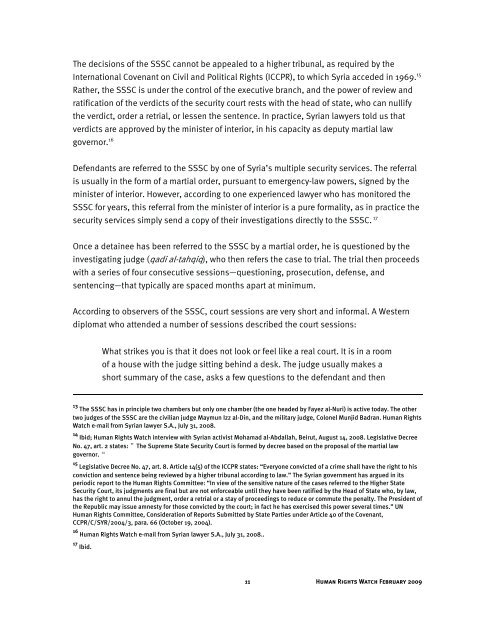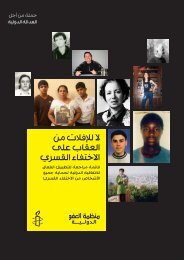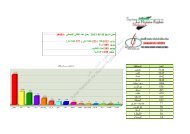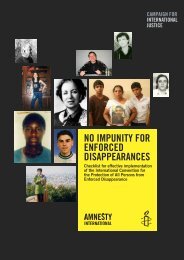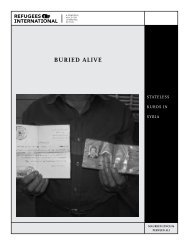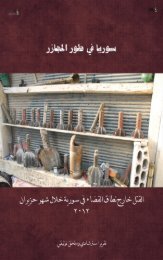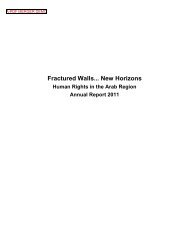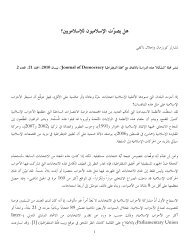The decisions of the SSSC cannot be appealed to a higher tribunal, as required by theInternational Covenant on Civil and Political <strong>Rights</strong> (ICCPR), to which Syria acceded in 1969. 15Rather, the SSSC is under the control of the executive branch, and the power of review andratification of the verdicts of the security court rests with the head of state, who can nullifythe verdict, order a retrial, or lessen the sentence. In practice, Syrian lawyers told us thatverdicts are approved by the minister of interior, in his capacity as deputy martial lawgovernor. 16Defendants are referred to the SSSC by one of Syria’s multiple security services. The referralis usually in the form of a martial order, pursuant to emergency-law powers, signed by theminister of interior. However, according to one experienced lawyer who has monitored theSSSC for years, this referral from the minister of interior is a pure formality, as in practice thesecurity services simply send a copy of their investigations directly to the SSSC. 17Once a detainee has been referred to the SSSC by a martial order, he is questioned by theinvestigating judge (qadi al-tahqiq), who then refers the case to trial. The trial then proceedswith a series of four consecutive sessions—questioning, prosecution, defense, andsentencing—that typically are spaced months apart at minimum.According to observers of the SSSC, court sessions are very short and informal. A Westerndiplomat who attended a number of sessions described the court sessions:What strikes you is that it does not look or feel like a real court. It is in a roomof a house with the judge sitting behind a desk. The judge usually makes ashort summary of the case, asks a few questions to the defendant and then13 The SSSC has in principle two chambers but only one chamber (the one headed by Fayez al-Nuri) is active today. The othertwo judges of the SSSC are the civilian judge Maymun Izz al-Din, and the military judge, Colonel Munjid Badran. <strong>Human</strong> <strong>Rights</strong><strong>Watch</strong> e-mail from Syrian lawyer S.A., July 31, 2008.14 Ibid; <strong>Human</strong> <strong>Rights</strong> <strong>Watch</strong> interview with Syrian activist Mohamad al-Abdallah, Beirut, August 14, 2008. Legislative DecreeNo. 47, art. 2 states: ”The Supreme State Security Court is formed by decree based on the proposal of the martial lawgovernor.“15 Legislative Decree No. 47, art. 8. Article 14(5) of the ICCPR states: “Everyone convicted of a crime shall have the right to hisconviction and sentence being reviewed by a higher tribunal according to law.” The Syrian government has argued in itsperiodic report to the <strong>Human</strong> <strong>Rights</strong> Committee: “In view of the sensitive nature of the cases referred to the Higher StateSecurity Court, its judgments are final but are not enforceable until they have been ratified by the Head of State who, by law,has the right to annul the judgment, order a retrial or a stay of proceedings to reduce or commute the penalty. The President ofthe Republic may issue amnesty for those convicted by the court; in fact he has exercised this power several times.” UN<strong>Human</strong> <strong>Rights</strong> Committee, Consideration of Reports Submitted by State Parties under Article 40 of the Covenant,CCPR/C/SYR/2004/3, para. 66 (October 19, 2004).16 <strong>Human</strong> <strong>Rights</strong> <strong>Watch</strong> e-mail from Syrian lawyer S.A., July 31, 2008..17 Ibid.11 <strong>Human</strong> <strong>Rights</strong> <strong>Watch</strong> February 2009
the session is over. The defense lawyers never speak, and I have never seenany physical evidence presented. The whole session does not last more than30 minutes per group [of defendants]. 18The court occupies a flat on the first floor of a building on 29 Ayyar Street in Damascus. 19 Theprosecutor’s office is located on the second floor, and the third floor contains thepresident’s chamber. In recent years, Fayez al-Nuri, the president of the court, has heldmany court sessions in his own office rather than in the actual court. 20 The SSSC trial roomwas relocated in June 2008 to the building of the Ministry of <strong>Justice</strong> (wing of the Judges’Institute) in Mazzeh, Damascus. According to diplomats who visited the new location, “themove is temporary as the old building is renovated” but no one knows exactly how long thiswill take. 21The court sessions are not open to the public and the families of detainees cannot attend.They wait outside the court in the hope of seeing their relatives as they are transferred insidethe court building. 22 Such blanket exclusion of the public from the courtroom violates theICCPR, which states that the public may be excluded from a trial only for reasons of ”morals,public order or national security in a democratic society,“or ”when the interest of the privatelives of the parties so requires.“ 23 The situation for the families got harder after the SSSCmoved to its temporary new location. One Syrian lawyer told us, “in the old court, they couldstand on the sidewalk outside the courtroom and see the defendants as they were broughtin to the court. Today, they can’t get close because it is at the Ministry of <strong>Justice</strong>.” 24 The onlyexception in terms of access is for diplomats who gained access to the SSSC in 2004. AEuropean diplomat explained to <strong>Human</strong> <strong>Rights</strong> <strong>Watch</strong>, “the Syrian authorities never formallypermitted our presence. At some point they just started to tolerate it.” 2518 <strong>Human</strong> <strong>Rights</strong> <strong>Watch</strong> interview with Damascus-based Western diplomat N.R., Beirut, November 4, 2008.19 <strong>Human</strong> <strong>Rights</strong> <strong>Watch</strong> Interview with Mohamad al-Abdallah, Beirut, August 14, 2008.20 <strong>Human</strong> <strong>Rights</strong> <strong>Watch</strong> interview with Damascus-based Western diplomat C.D., Beirut, April 14, 2008. Legislative Decree 47,art. 1 provides that the President of the Court has “the right to hold the trial session in any place and time he deems suitable.”21 <strong>Human</strong> <strong>Rights</strong> <strong>Watch</strong> e-mail from Damascus-based Western diplomat N.R., August 28, 2008.22 <strong>Human</strong> <strong>Rights</strong> <strong>Watch</strong> interview with Damascus-based Western diplomat C.D., Beirut, April 14, 2008; <strong>Human</strong> <strong>Rights</strong> <strong>Watch</strong>Interview with Mohamad al-Abdallah, Beirut, August 14, 2008.23 Article 14(1) of the ICCPR states: “The press and the public may be excluded from all or part of a trial for reasons of morals,public order (ordre public) or national security in a democratic society, or when the interest of the private lives of the partiesso requires, or to the extent strictly necessary in the opinion of the court in special circumstances where publicity wouldprejudice the interests of justice.“24 <strong>Human</strong> <strong>Rights</strong> <strong>Watch</strong> e-mail from Syrian lawyer S.A., July 31, 2008.25 <strong>Human</strong> <strong>Rights</strong> <strong>Watch</strong> e-mail from Damascus-Based Western Diplomat B.B., August 14, 2008. See Section V. (“Monitoring ofthe SSSC by the Diplomatic Community”) below for a fuller discussion of the role of the diplomats at the SSSC.<strong>Far</strong> <strong>From</strong> <strong>Justice</strong> 12
- Page 1 and 2: SyriaFar From JusticeSyria’s Supr
- Page 3 and 4: Copyright © 2009 Human Rights Watc
- Page 6 and 7: I. SummaryIt is not really a judici
- Page 8 and 9: denies lawyers the opportunity to e
- Page 10 and 11: elonging to groups planning terrori
- Page 12 and 13: The Syrian authorities have demonst
- Page 14 and 15: conducted interviews with them over
- Page 18 and 19: With the exception of a few cases,
- Page 20 and 21: of a court session when the detaine
- Page 22 and 23: silent, and only the judge and mukh
- Page 24 and 25: parties other than the ruling Ba`at
- Page 26 and 27: In subsequent years, the SSSC has r
- Page 28 and 29: possession of CD's, booklets etc. o
- Page 30 and 31: Ocalan was based in Damascus, and t
- Page 32 and 33: IV. The SSSC’s Recent Activities:
- Page 34 and 35: November 4, 2007November 11, 2007No
- Page 36 and 37: A third detainee sentenced by the S
- Page 38 and 39: interpreted narrowly, with terms su
- Page 40 and 41: eputation of the country,” conclu
- Page 42 and 43: anything. The judge said they will
- Page 44 and 45: not note any additional evidence pr
- Page 46 and 47: democracy.” 138 The sentencing wa
- Page 48 and 49: state’s laws are not criminals. A
- Page 50 and 51: After signing, they took us to `Adr
- Page 52 and 53: “belonging to a secret organizati
- Page 54 and 55: Muslim Brotherhood. Syrian security
- Page 56 and 57: Another diplomat saw additional adv
- Page 58 and 59: With respect to the legal system•
- Page 60 and 61: With respect to Syria’s more gene
- Page 62 and 63: IX. AppendicesAnnex I - List of Jud
- Page 64 and 65: Shirzad bin27Muhammad SamiBakrNear
- Page 66 and 67:
505152535455565758596061Muhammad Ah
- Page 68 and 69:
747576777879808182Wasim MuhammadJam
- Page 70 and 71:
102`Abd al-Khubar`Alawi bin Ahmadb.
- Page 72 and 73:
135Ahmad al-`Ujaylb. 1982Deir al-Zu
- Page 74 and 75:
16316416516616716816917017117217317
- Page 76 and 77:
196197Jam`a bin Hussain al-ShahadaY
- Page 78 and 79:
228Jamal Nab`a binHassanUnknown 25-


